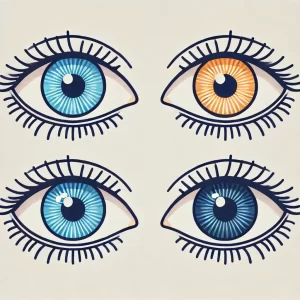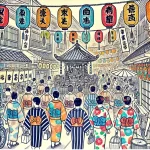アイドル [Aidoru]
YOASOBI [Yoasobi]
Words & Music : Ayase [Ayase]
“Idol” is a song by the music group “Yoasobi.” It was produced as the opening theme for the TV anime series “Oshi no Ko web“.
Many of you may know that it became a worldwide hit, reaching No. 1 on the Billboard Global Excl. U.S. chart, which ranks songs from around the world excluding the United States, and No. 7 on the Billboard Global 200, the highest rank for a Japanese artist’s song. It also topped the YouTube music charts globally.
So, what exactly is an “アイドル / aidoru”? Originally, it comes from the English word “idol,” meaning someone or something that is worshipped. However, in Japanese, “アイドル / aidoru wiki” refers to singers, actors, or talents whose main sales base is enthusiastic fans with romantic feelings. The business model of Japanese idols has influenced other businesses like K-pop.
Let’s list a few famous singers or groups. Momoe Yamaguchi, Hiromi Go, Candies, Akina Nakamori, Kyoko Koizumi, Smap … The very famous Seiko Matsuda who we covered in the last article is also worth mentioning, and more recently, groups like Arashi and AKB48 might be known to many of you.
This song focus on the theme of idols. By the way, “Yoasobi” is not an idol.
無敵の笑顔で荒らすメディア
muteki no egao de arasu media
知りたいその秘密ミステリアス
shiritai sono himitsu misuteriasu
抜けてるとこさえ彼女のエリア
nuketeru toko sae kanojo no eria
完璧で嘘つきな君は
kanpeki de usotsuki na kimi wa
天才的なアイドル様
tensaiteki na aidoru sama
- 無敵(むてき) [muteki] : invincible
- 笑顔(えがお) [egao] : smile
- メディア(めでぃあ) [media] : media
- 秘密(ひみつ) [himitsu] : secret
- ミステリアス [misuteriasu] : mysterious
- 抜けている(ぬけている)[nukete iru] : missing
- 彼女(かのじょ) [kanojo] : she
- エリア (えりあ)[eria] : area
- 完璧(かんぺき) [kanpeki] : perfect
- 嘘つき(うそつき) [usotsuki] : liar
- 君(きみ) [kimi] : you
- 天才的(てんさいてき)[tensaiteki] : genius
- アイドル (あいどる)[aidoru] : idol
- 様(さま)[sama] : sama (honorific)
(translation) “With an invincible smile, she dominates the media.
People want to know her secrets. She’s very mysterious.
Even her clumsy parts are her domain.
You, perfect and a liar, are a genius idol.”
I will talk about this story, assuming the main character is a woman, based on the dialogue and situation.
First of all, let me tell you that these lyrics can be confusing, with missing subjects and shifting targets.
Next, there are many illogical depictions. This is a characteristic of modern lyrics. They are less poetic but use more realistic words, allowing you to focus on interpreting them sensually. This might make it easier to study if you don’t intend to translate perfectly.
Another characteristic of this song is its unique pronunciation. Typically, in Japanese songs, one note is assigned to each syllable (more accurately, each mora), making it easy to understand. However, in this song, some notes compress two syllables. For example, the beginning part is usually
“mu-te-ki-no-e-ga-…,” but here it is
“mu-te-ki-noe-ga-o-…”.
English speakers might not understand what’s unique about this, lol. I like this kind of thing. By the way, you can understand the basic rules of Japanese pronunciation by watching a video I made.
今日何食べた?
kyō nani tabeta
好きな本は?
sukina hon wa
遊びに行くならどこに行くの?
asobi ni iku nara doko ni iku no
- 今日(きょう) [kyō] : today
- 何(なに) [nani] : what
- 食べる(たべる) [taberu] : eat
- 好きな(すきな) [sukina] : favorite
- 本(ほん) [hon] : book
- 遊びに行く(あそびにいく) [asobi ni iku] : go out
- どこ(どこ)[doko] : where
- 行く(いく)[iku] : go
(translation) “What did you eat today?
What’s your favorite book?
If you’re going out, where would you go?”
These sentences look like they could be from the beginning of a Japanese textbook. This likely depicts a scene where a fan is asking questions to an idol. Imagine something like a YouTube live stream where viewers leave comments.

何も食べてない
nanimo tabetenai
それは内緒
sore wa naisho
何を聞かれても
nani o kikaretemo
のらりくらり
norari kurari
- 何(なに)[nani] : what
- それ(それ) [sore] : that
- 内緒(ないしょ) [naisho] : secret
- 聞く(きく) [kiku] : ask
- のらりくらり [norari kurari] : evasively
(translation) “I haven’t eaten anything.
That’s a secret.
No matter what she’s asked,
she responds evasively.”
“のらりくらり / Norari kurari” is a unique Japanese onomatopoeia. It describes someone moving sluggishly. She is asked many questions but cannot answer them all. She might find it annoying. But as an “aidoru,” it’s not good to show that attitude. So “norari kurari” is the best approach.

そう淡々と
sō tantan to
だけど燦々と
dakedo sansan to
見えそうで見えない秘密は蜜の味
miesō de mienai himitsu wa mitsu no aji
- 淡々と(たんたんと) [tantan to] : indifferently
- 燦々と(さんさんと)[sansan to] : brilliantly
- 見える(みえる)[mieru] : can see
- 蜜(みつ) [mitsu] : honey
- 味(あじ) [aji] : taste
(translation) “Yeah, indifferently
but brilliantly.
A secret that seems visible but isn’t tastes like honey.”
There is a saying that other people’s misfortune is the taste of honey. Forbidden things always seem very appealing.
あれもないないない
are mo nai nai nai
これもないないない
kore mo nai nai nai
好きなタイプは?
sukina taipu wa
相手は?
aite wa
さあ答えて
sā kotaete
- あれ [are] : that
- これ [kore] : this
- ない [nai] : no
- タイプ [taipu] : type
- 相手(あいて) [aite] : partner
- 答える(こたえる) [kotaeru] : answer
(translation) “That’s a NO NO NO,
This is a NO NO NO,
What’s your type?
Who’s your partner?
Come on, answer.”
“ない / nai” can mean “does not exist,” but here it means “no” in context.
The question about “あいて / aite” likely refers to a romantic partner.
「誰かを好きになることなんて私分からなくてさ」
dareka o suki ni naru koto nante watashi wakaranakute sa
嘘か本当か知り得ない
uso ka hontō ka shirienai
そんな言葉にまた一人堕ちる
sonna kotoba ni mata hitori ochiru
また好きにさせる
mata suki ni saseru
- 誰か(だれか)[dareka] : someone
- 分からない(わからない) [wakaranai] : not understand
- 嘘(うそ) [uso] : lie
- 本当(ほんとう) [hontō] : truth
- 知る(しる) [shiru] : know
- 言葉(ことば) [kotoba] : words
- 落ちる・堕ちる(おちる)[ochiru] : fall
(translation) “‘I don’t understand what it means to love someone,’
Whether it’s a lie or the truth,
someone else falls for those words,
making them love her again.”
This part is skillful. The tone suddenly becomes lyrical, and she seems to express her vulnerability with lines like “I don’t understand what it means to love someone.” Is this her true feeling? Or is it her strategy? When she reveals something that seems genuine, people fall in love. What a magic! Scary!

誰もが目を奪われていく
daremo ga me o ubawarete iku
君は完璧で究極のアイドル
kimi wa kanpeki de kyūkyoku no aidoru
金輪際現れない
konrinzai arawarenai
一番星の生まれ変わり
ichibanboshi no umarekawari
- 誰も(だれも)[dare mo] : everyone
- 目(め)[me] : eye
- 奪われる(うばわれる)[ubawareru] : be captivated
- 究極(きゅうきょく) [kyūkyoku] : ultimate
- 金輪際(こんりんざい)[konrinzai] : never again
- 現れる(あらわれる)[arawareru] : appear
- 一番星(いちばんぼし)[ichibanboshi] : brightest star
- 生まれ変わり(うまれかわり)[umarekawari] : reincarnation
(translation) “Everyone is captivated by you.
You are the perfect and ultimate idol.
You will never appear again,
the reincarnation of the brightest star.”
“目を奪われる / me o ubawareru” means to have one’s eyes captivated, and “心を奪われる / kokoro o ubawareru” means to have one’s heart captivated. Although “心 / kokoro” might be more appropriate here, it’s fine as is.
その笑顔で愛してるで
sono egao de aishiteru de
誰も彼も虜にしていく
daremo karemo toriko ni shite iku
- 笑顔(えがお) [egao] : smile
- 愛している(あいしている) [aishiteru] : love
- 虜(とりこ)[toriko] : captive
(translation) “With that smile and ‘I love you,’
she captivates everyone.”
At first, I read “愛してるで / aishiteru de” and mistook it for a Kansai dialect (a representative dialect of Japan). The translation above is probably correct.
その瞳がその言葉が
sono hitomi ga sono kotoba ga
嘘でもそれは完全なアイ
uso demo sore wa kanzen na ai
- 瞳(ひとみ) [hitomi] : pupil
- 完全(かんぜん) [kanzen] : perfect
- 愛(あい) [ai] : love
(translation) “Those eyes, those words,
even if they are lies, they are perfect ‘love.'”
“瞳 / hitomi” means “pupil,” but here it is used to mean “eye.” “Hitomi” is considered more beautiful sounding, and is often used in lyrics to mean “eye.”

When “愛 / ai” is written in katakana (“アイ / ai”), it implies a special meaning. Like putting something in quotation marks or using a hand gesture to indicate quotation marks. Here, it suggests “fictional love”. The person she loves is her fan.
Google Search – quotation gesture
Let’s move through the rest quickly.
はいはいあの子は特別です
hai hai ano ko wa tokubetsu desu
我々はハナからおまけです
wareware wa hana kara omake desu
お星様の引き立て役Bです
ohoshisama no hikitate yaku bī desu
全てがあの子のお陰なわけない
subete ga ano ko no okage na wake nai
洒落臭い
sharakusai
妬み嫉妬なんてないわけがない
netami shitto nante nai wake ga nai
これはネタじゃない
kore wa neta janai
からこそ許せない
kara koso yurusenai
完璧じゃない君じゃ許せない
kanpeki janai kimi ja yurusenai
自分を許せない
jibun o yurusenai
誰よりも強い君以外は認めない
dare yori mo tsuyoi kimi igai wa mitomenai
(translation) “Yes, yes, that girl is special.
We were just extras from the start.
Supporting characters to the stars B.
It’s not all thanks to her.
It’s too much.
There’s no way there’s no jealousy or envy.
This isn’t a joke.
That’s why I can’t forgive.
I can’t forgive anyone but an imperfect you.
I can’t forgive myself.
I won’t accept anyone other than you, the strongest.”
誰もが信じ崇めてる
daremo ga shinji agameteru
まさに最強で無敵のアイドル
masa ni saikyō de muteki no aidoru
弱点なんて見当たらない
jakuten nante miataranai
一番星を宿している
ichibanboshi o yadoshite iru
弱いとこなんて見せちゃダメダメ
yowai toko nante miseccha dame dame
知りたくないとこは見せずに
shiritakunai toko wa misenzu ni
唯一無二じゃなくちゃイヤイヤ
yuiitsu muni janakucha iya iya
それこそ本物のアイ
sore koso honmono no ai
(translation) “Everyone believes and worships you,
Truly the strongest and invincible idol.
No weaknesses to be found.
You host the brightest star.
Don’t show any weaknesses, no, no.
Don’t show the parts I don’t want to know.
You must be one of a kind, or it’s no good.
That’s what a real love is.”
得意の笑顔で沸かすメディア
tokui no egao de wakasu media
隠しきるこの秘密だけは
kakushikiru kono himitsu dake wa
愛してるって嘘で積むキャリア
aishiteru tte uso de tsumu kyaria
これこそ私なりの愛だ
kore koso watashi nari no ai da
流れる汗も綺麗なアクア
nagareru ase mo kirei na akua
ルビーを隠したこの瞼
rubī o kakushita kono mabuta
歌い踊り舞う私はマリア
utai odori mau watashi wa maria
そう嘘はとびきりの愛だ
sō uso wa tobikiri no ai da
(translation) “Making the media excited with my signature smile,
Only this secret is hidden away.
Building a career on the lie of love,
This is my way of love.
Even the sweat that flows is a beautiful aqua.
These eyelids hide a ruby.
Singing, dancing, and performing, I am Maria.
Yes, lies are the ultimate love.”
誰かに愛されたことも
dareka ni aisareta koto mo
誰かのこと愛したこともない
dareka no koto aishita koto mo nai
そんな私の嘘がいつか本当になること
sonna watashi no uso ga itsuka hontō ni naru koto
信じてる
shinjiteru
(translation) “I’ve never been loved by anyone,
And I’ve never loved anyone.
I believe that one day my lie will become the truth.”
いつかきっと全部手に入れる
itsuka kitto zenbu te ni ireru
私はそう欲張りなアイドル
watashi wa sō yokubari na aidoru
等身大でみんなのこと
tōshindai de minna no koto
ちゃんと愛したいから
chanto aishitai kara
今日も嘘をつくの
kyō mo uso o tsuku no
この言葉がいつか本当になる日を願って
kono kotoba ga itsuka hontō ni naru hi o negatte
それでもまだ
sore demo mada
君と君にだけは言えずにいたけど
kimi to kimi ni dake wa iezu ni ita kedo
やっと言えた
yatto ieta
これは絶対嘘じゃない
kore wa zettai uso janai
愛してる
aishiteru
(translation) “Someday, I’ll have it all.
I’m a greedy idol like that.
Because I want to love everyone for who they are,
I tell lies today as well.
Wishing for the day when these words will become true,
Even so,
I haven’t been able to say it to you and only you.
But I finally said it.
This is definitely not a lie.
I love you.”
You can see that toward the end, the kanji “愛 / ai” is used instead of the katakana “アイ / ai”. The heroine in these lyrics, who is an idol, seems to genuinely express her desire to love her fans with genuine “LOVE” someday.
Thanks for reading! Feel free to comment if you have any feedback or questions.
Follow me on X.



